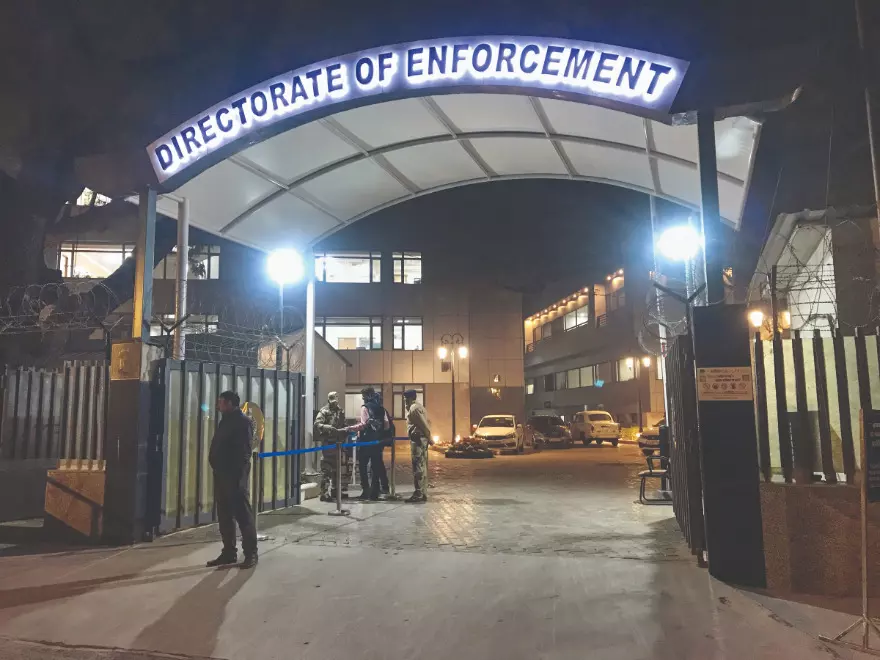Why you being used for political battles: SC to ED

New Delhi: The Supreme Court on Monday upheld a Karnataka High Court order quashing the Enforcement Directorate’s (ED) proceedings against Karnataka Chief Minister Siddaramaiah’s wife, B M Parvathi, in the Mysuru Urban Development Authority (MUDA) land case. The apex court also raised serious concerns over the ED’s functioning in politically sensitive matters, warning against its misuse in partisan conflicts.
A bench comprising Chief Justice B R Gavai and Justice K Vinod Chandran delivered a stinging rebuke while hearing the ED’s appeal, asking, “Let political battles be fought before the electorate. Why are you being used?”
Additional Solicitor General S V Raju, appearing for the ED, was told by the CJI, “Mr Raju, please don’t compel us to open our mouths. Otherwise, we will be forced to make some harsh comments about the ED. Unfortunately, I have some experience in Maharashtra. Don’t perpetuate this violence across the country.”
The court dismissed the ED’s appeal, saying, “We do not find any error in the reasoning adopted in the approach of the learned single judge.” In a lighter moment, the bench added, “We should thank you, ASG, for saving some harsh comments.”
The case involves the allotment of 14 sites to Parvathi under a controversial compensation scheme. The sites, located in upscale areas of Mysuru’s Vijayanagar 3rd and 4th Stages, were allegedly allocated illegally in exchange for 3.16 acres of land reportedly owned by her. The ED’s provisional attachment order dated January 17 had pegged the site value at approximately Rs 56 crore and accused Parvathi and others of using political influence.
However, in June, the Karnataka Lokayukta Police gave a clean chit to Parvathi, Siddaramaiah, and other co-accused, citing insufficient evidence. The original FIR had been registered by Lokayukta police on September 27, 2024, following a special court order.
The Karnataka High Court, in its March 7 ruling, had not only annulled the ED summons to Parvathi but also quashed the summons issued to state Urban Development Minister Byrathi Suresh. Though not named as an accused, he was called for questioning by the ED. The summons had earlier been stayed by the High Court on January 27.
The MUDA case revolves around a 50:50 land-sharing scheme, wherein landowners whose property is acquired for development are compensated with 50% of developed plots. The ED alleged that Parvathi had no valid title over the land she claimed, and yet received prime developed plots under this scheme.
The apex court, while affirming the High Court’s reasoning, also voiced concerns about the broader implications of investigative overreach in politically sensitive matters.
Earlier in the day, the bench also heard a separate petition filed by the Karnataka Government challenging the quashing of a criminal case against BJP MP Tejasvi Surya, related to remarks on an alleged farmer suicide. Dismissing the plea, the CJI said, “What is this? Don’t politicise the matter. Fight your battles before the electorate.”
During the proceedings, Solicitor General Tushar Mehta, without naming any individual or political party, referred to instances of narrative-building outside the courtroom. “Sometimes, if I am a politician involved in a Rs 3,000 crore scam, I can build a narrative in my favour through multiple interviews,” he said.
CJI Gavai responded, “Unfortunately, we all know the ground reality also.” He clarified that judgments are based solely on facts presented in court, “Have you seen any of our judgments which are based on narratives, and not on the facts of that case? If there is one, please show it to me.”
Justice Chandran added, “Narratives will go on over there. People might be concerned. But you can’t say that we will be influenced by it.” Mehta raised concerns over the impact such narratives can have on judicial proceedings. “It’s not about ED giving interviews. This is happening very purposefully, very designedly,” he said, urging the bench to consider whether such practices were legally appropriate.
He also argued that lawyers providing legal opinions should not be summoned by investigative agencies, a point echoed by Advocate Vipin Nair of the Supreme Court Advocates on Record Association. “It’s not just senior advocates. Even ordinary lawyers are affected. It’s the legal profession as a whole,” said Nair.
To illustrate the misuse of legal advice, Mehta recounted an incident from Ahmedabad where an accused sought help from a lawyer after committing murder. The CJI responded that such conduct would clearly fall under criminal offences defined by the Indian Penal Code.with agency inputs



